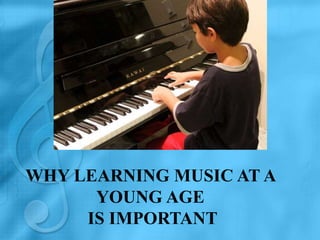Report
Share

Recommended
More Related Content
What's hot
What's hot (20)
Learning to play a pop song on keyboard with Black Eyed Peas.ppt

Learning to play a pop song on keyboard with Black Eyed Peas.ppt
Similar to Why study music
Similar to Why study music (20)
The Benefits of Music Classes for Preschoolers.pdf

The Benefits of Music Classes for Preschoolers.pdf
CHILDREN AND MUSIC BENEFITS OF MUSIC IN CHILD DEVELOPMENT 

CHILDREN AND MUSIC BENEFITS OF MUSIC IN CHILD DEVELOPMENT
Unlocking the Magic of Learning with a Preschool Music Program.

Unlocking the Magic of Learning with a Preschool Music Program.
More from Bangkok, Thailand
More from Bangkok, Thailand (20)
BIBLE QUIZ Isaiah 25 to 27 and 2 Corinthians 5 to 8.pptx

BIBLE QUIZ Isaiah 25 to 27 and 2 Corinthians 5 to 8.pptx
Things that begin with the short a sound with Thai translation.pptx

Things that begin with the short a sound with Thai translation.pptx
Why study music
- 1. WHY LEARNING MUSIC AT A YOUNG AGE IS IMPORTANT
- 2. Wolfgang Amadeus Mozart from Germany started writing classical compositions at age four. He performed publicly at the Salzburg University a year later. And at seven he picked up a violin and sight-read an entire piece with complete accuracy, without having ever had a violin lesson. Wolfgang Amadeus was a true child prodigy. And this is without mentioning -- you know -- that he went on to become one of the most highly regarded classical composers ever. -
- 3. Ludwig Van Beethoven was a German composer and pianist. He was taught by his father Johann Van Beethoven at an early age. He is the author of many compositions for the piano, violin, string quartets. He also composed symphonies (music for orchestras).
- 4. Alicia Keys, who was born in New York started piano lessons when she was 7 years old and went to performance art school. She is a famous singer and pianist
- 5. Born on June 20, 1983, in Waitsfield, Vermont, Grace Potter became the lead singer of the Nocturnals while attending St. Lawrence University.
- 6. Musical training helps develop language and reasoning: Students who have early musical training will develop the areas of the brain related to language and reasoning. The left side of the brain is better developed with music, and songs can help imprint information on young minds.
- 7. A mastery of memorization: Even when performing with sheet music, student musicians are constantly using their memory to perform. The skill of memorization can serve students well in education and beyond.
- 8. Students learn to improve their work: Learning music promotes craftsmanship, and students learn to want to create good work instead of mediocre work. This desire can be applied to all subjects of study.
- 9. Increased coordination: Students who practice with musical instruments can improve their hand-eye coordination. Just like playing sports, children can develop motor skills when playing music.
- 10. A sense of achievement: Learning to play pieces of music on a new instrument can be challenging, but an achievable goal. Students who master even the smallest goal in music will be able to feel proud of their achievement and so have good self confidence
- 11. Success in society: Music is the fabric of our society, and music can shape abilities and character. Students in band or orchestra are less likely to abuse substances over their lifetime. Musicians who are involved in church music or other organizations have something to be busy with so they are unlikely to join gangs or engage in vices
- 12. Emotional development: Students of music can be more emotionally developed, with empathy towards other cultures They also tend to have higher self esteem and are better at coping with anxiety.
- 13. Students can become better in Math subjects: Children can develop their math and pattern- recognition skills with the help of musical education. Playing music offers repetition in a fun format.
- 14. Better SAT scores: Students who have experience with music performance or appreciation score higher on the SAT. One report indicates 63 points higher on verbal and 44 points higher on math for students in music appreciation courses.
- 15. Fine-tuned auditory skills: Musicians can better detect meaningful, information-bearing elements in sounds, like the emotional meaning in a baby’s cry. Students who practice music can have better auditory attention, and pick out predictable patterns from surrounding noise.
- 16. Music builds imagination and intellectual curiosity: Introducing music in the early childhood years can help foster a positive attitude toward learning and curiosity. Artistic education develops the whole brain and develops a child’s imagination.
- 17. . Music can be relaxing: Students can fight stress by learning to play music. Soothing music is especially helpful in helping kids relax.
- 18. Musical instruments can teach discipline: Kids who learn to play an instrument can learn a valuable lesson in discipline. They will have to set time aside to practice and rise to the challenge of learning with discipline to master playing their instrument.
- 19. Preparation for the creative economy: Investing in creative education can prepare students for the 21st century workforce. The new economy has created more artistic careers, and these jobs may grow faster than others in the future.
- 21. Kids can learn teamwork: Many musical education programs require teamwork as part of a band or orchestra. In these groups, students will learn how to work together and build camaraderie.
